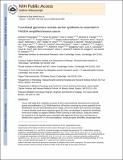| dc.contributor.author | Possemato, Richard | |
| dc.contributor.author | Marks, Kevin M. | |
| dc.contributor.author | Kim, Dohoon | |
| dc.contributor.author | Birsoy, Kivanc | |
| dc.contributor.author | Sethumadhavan, Shalini | |
| dc.contributor.author | Woo, Hin-Koon | |
| dc.contributor.author | Jang, Hyun G. | |
| dc.contributor.author | Jha, Abhishek K. | |
| dc.contributor.author | Chen, Walter W. | |
| dc.contributor.author | Barrett, Francesca G. | |
| dc.contributor.author | Stransky, Nicolas | |
| dc.contributor.author | Tsun, Zhi-Yang | |
| dc.contributor.author | Cowley, Glenn S. | |
| dc.contributor.author | Barretina, Jordi | |
| dc.contributor.author | Kalaany, Nada Y. | |
| dc.contributor.author | Hsu, Peggy P. | |
| dc.contributor.author | Ottina, Kathleen | |
| dc.contributor.author | Chan, Albert M. | |
| dc.contributor.author | Yuan, Bingbing B. | |
| dc.contributor.author | Garraway, Levi A. | |
| dc.contributor.author | Root, David E. | |
| dc.contributor.author | Mino-Kenudson, Mari | |
| dc.contributor.author | Brachtel, Elena F. | |
| dc.contributor.author | Driggers, Edward M. | |
| dc.contributor.author | Shaul, Yoav | |
| dc.contributor.author | Pacold, Michael Edward | |
| dc.contributor.author | Sabatini, David | |
| dc.date.accessioned | 2012-11-01T18:41:15Z | |
| dc.date.available | 2012-11-01T18:41:15Z | |
| dc.date.issued | 2011-08 | |
| dc.date.submitted | 2010-10 | |
| dc.identifier.issn | 0028-0836 | |
| dc.identifier.issn | 1476-4687 | |
| dc.identifier.uri | http://hdl.handle.net/1721.1/74552 | |
| dc.description.abstract | Cancer cells adapt their metabolic processes to drive macromolecular biosynthesis for rapid cell growth and proliferation[superscript 1, 2]. RNA interference (RNAi)-based loss-of-function screening has proven powerful for the identification of new and interesting cancer targets, and recent studies have used this technology in vivo to identify novel tumour suppressor genes[superscript 3]. Here we developed a method for identifying novel cancer targets via negative-selection RNAi screening using a human breast cancer xenograft model at an orthotopic site in the mouse. Using this method, we screened a set of metabolic genes associated with aggressive breast cancer and stemness to identify those required for in vivo tumorigenesis. Among the genes identified, phosphoglycerate dehydrogenase (PHGDH) is in a genomic region of recurrent copy number gain in breast cancer and PHGDH protein levels are elevated in 70% of oestrogen receptor (ER)-negative breast cancers. PHGDH catalyses the first step in the serine biosynthesis pathway, and breast cancer cells with high PHGDH expression have increased serine synthesis flux. Suppression of PHGDH in cell lines with elevated PHGDH expression, but not in those without, causes a strong decrease in cell proliferation and a reduction in serine synthesis. We find that PHGDH suppression does not affect intracellular serine levels, but causes a drop in the levels of α-ketoglutarate, another output of the pathway and a tricarboxylic acid (TCA) cycle intermediate. In cells with high PHGDH expression, the serine synthesis pathway contributes approximately 50% of the total anaplerotic flux of glutamine into the TCA cycle. These results reveal that certain breast cancers are dependent upon increased serine pathway flux caused by PHGDH overexpression and demonstrate the utility of in vivo negative-selection RNAi screens for finding potential anticancer targets. | en_US |
| dc.description.sponsorship | Susan G. Komen Breast Cancer Foundation (Fellowship) | en_US |
| dc.description.sponsorship | Life Sciences Research Foundation (Fellowship) | en_US |
| dc.description.sponsorship | W. M. Keck Foundation | en_US |
| dc.description.sponsorship | David H. Koch Cancer Research Fund | en_US |
| dc.description.sponsorship | Alexander and Margaret Stewart Trust | en_US |
| dc.description.sponsorship | National Institutes of Health (U.S.) (Grant CA103866) | en_US |
| dc.language.iso | en_US | |
| dc.publisher | Nature Publishing Group | en_US |
| dc.relation.isversionof | http://dx.doi.org/10.1038/nature10350 | en_US |
| dc.rights | Creative Commons Attribution-Noncommercial-Share Alike 3.0 | en_US |
| dc.rights.uri | http://creativecommons.org/licenses/by-nc-sa/3.0/ | en_US |
| dc.source | PMC | en_US |
| dc.title | Functional genomics reveals serine synthesis is essential in PHGDH-amplified breast cancer | en_US |
| dc.type | Article | en_US |
| dc.identifier.citation | Possemato, Richard et al. “Functional Genomics Reveal That the Serine Synthesis Pathway Is Essential in Breast Cancer.” Nature 476.7360 (2011): 346–350. | en_US |
| dc.contributor.department | Massachusetts Institute of Technology. Department of Biology | en_US |
| dc.contributor.department | Whitehead Institute for Biomedical Research | en_US |
| dc.contributor.department | Koch Institute for Integrative Cancer Research at MIT | en_US |
| dc.contributor.mitauthor | Possemato, Richard | |
| dc.contributor.mitauthor | Shaul, Yoav D. | |
| dc.contributor.mitauthor | Pacold, Michael E. | |
| dc.contributor.mitauthor | Kim, Dohoon | |
| dc.contributor.mitauthor | Birsoy, Kivanc | |
| dc.contributor.mitauthor | Chen, Walter W. | |
| dc.contributor.mitauthor | Tsun, Zhi-Yang | |
| dc.contributor.mitauthor | Kalaany, Nada Y. | |
| dc.contributor.mitauthor | Hsu, Peggy P. | |
| dc.contributor.mitauthor | Ottina, Kathleen | |
| dc.contributor.mitauthor | Chan, Albert M. | |
| dc.contributor.mitauthor | Yuan, Bingbing B. | |
| dc.contributor.mitauthor | Sabatini, David M. | |
| dc.relation.journal | Nature | en_US |
| dc.eprint.version | Author's final manuscript | en_US |
| dc.type.uri | http://purl.org/eprint/type/JournalArticle | en_US |
| eprint.status | http://purl.org/eprint/status/PeerReviewed | en_US |
| dspace.orderedauthors | Possemato, Richard; Marks, Kevin M.; Shaul, Yoav D.; Pacold, Michael E.; Kim, Dohoon; Birsoy, Kıvanç; Sethumadhavan, Shalini; Woo, Hin-Koon; Jang, Hyun G.; Jha, Abhishek K.; Chen, Walter W.; Barrett, Francesca G.; Stransky, Nicolas; Tsun, Zhi-Yang; Cowley, Glenn S.; Barretina, Jordi; Kalaany, Nada Y.; Hsu, Peggy P.; Ottina, Kathleen; Chan, Albert M.; Yuan, Bingbing; Garraway, Levi A.; Root, David E.; Mino-Kenudson, Mari; Brachtel, Elena F.; Driggers, Edward M.; Sabatini, David M. | en |
| dc.identifier.orcid | https://orcid.org/0000-0003-3688-2378 | |
| dc.identifier.orcid | https://orcid.org/0000-0002-2401-0030 | |
| dc.identifier.orcid | https://orcid.org/0000-0002-7043-5013 | |
| dc.identifier.orcid | https://orcid.org/0000-0002-1446-7256 | |
| mit.license | OPEN_ACCESS_POLICY | en_US |
| mit.metadata.status | Complete | |
